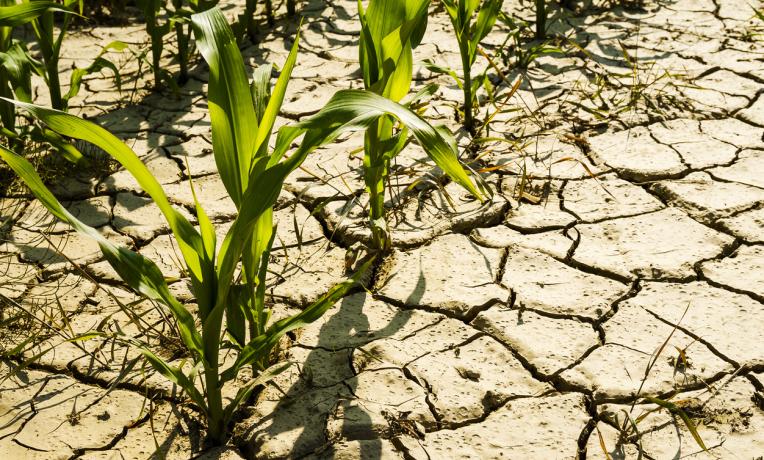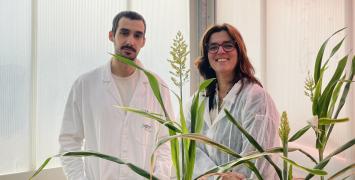How do you make plants drought-resistant without stunting growth?
Stressed plants typically stop growing. With her ERC grant, Prof. Ana Caño-Delgado has developed and is applying an innovative approach to generate drought-resistant plants that continue growing. This could play an important role in ensuring food security when water is scarce.

Drought is a major cause of crop losses globally. The main underlying mechanism of plant response to drought stress is known, and drought-resistance genes have been engineered into crop plants. However, these drought-resistant crops have low yields. There is an urgent need for novel approaches that can produce high-yielding drought-resistant crops.
As a result of the IDRICA project, researchers have succeeded for the first time in engineering plants with enhanced drought resistance without penalising growth. The key innovation was not to engineer plants with drought-resistance genes, but to modify the signalling process for a group of plant hormones called brassinosteroids.
“This was really an astonishing finding because normally when you make plants resistant to any stress, the first thing they do when they encounter stress is to stop growing. We could break this coupling between resistance to drought and arrested growth by manipulating cell signalling in vascular cells,” says Ana Caño-Delgado, CSIC Associate Professor at the Centre for Research in Agricultural Genomics (CRAG) in Spain.
Plants that ignore stress
The first part of the project aimed at understanding drought resistance in plants at the molecular level. Plant brassinosteroids, first discovered in brassicas, are important regulators of plant growth and development. Research on the plant Arabidopsis thaliana over the past 20-30 years has revealed how these plant hormones bind to different cell surface receptors, causing signals to pass through the cell that instruct the nucleus to make the proteins needed for growth and development. “At the time of the grant application, we were beginning to discover how these hormones act on cell-specific components,” explains Caño-Delgado. “We raised the hypothesis that we could engineer cell-specific signalling, to make plants more resilient to stresses.” At this time, the team also filed a patent based on their initial work with Arabidopsis, for a new process to make plants resistant to drought without penalising growth.
The project team have recently published a paper in Nature Communications reporting on how they modified signalling in vascular cells. “It is like playing a trick on the plants; basically, we are hacking the system that responds to stress so plants don’t realise that there is stress. The plants are even moving more sugars and osmeoprotective compounds through vascular cells in a more efficient manner than normally,” says Caño-Delgado.
In trials, Arabidopsis plants were grown under severe drought for two weeks. The modified plants did not exhibit typical drought responses and kept growing. Therefore, by just modifying brassinosteroid signalling locally in the vascular system, the project team obtained drought-resistant plants without affecting their growth.
Agricultural applications
“The second part of the grant is bringing these findings to agriculture,” Caño-Delgado explains. “We have chosen sorghum as a model cereal. The most important crop losses caused by drought are in cereals, and sorghum is very amenable to work with in the lab.”
Sorghum already has enhanced drought resistance compared to other cereals, is a staple crop in arid parts of Africa and India, and is regarded as a vanguard cereal under drought conditions exacerbated by climate change.
The project team are using gene editing techniques that modify plant steroid signalling to make drought-resistant sorghum. In future, the approach will be extended to wheat and other crops. The approach is also applicable to other types of stress, such as plant pathogens.
Caño-Delgado describes this cell-specific engineering strategy as an important step in modernising agriculture to find solutions to food security challenges. She suggests that the focus on single cells is going to be increasingly important in tackling responses to environmental change in agriculture in the future.
“My grant is a good example of how fundamental academic research supported by Horizon 2020 can give solutions in the short-term,” she says. “I think this is a new frontier for agriculture.”
This article was first published on the Europa website Research and Innovation InfoCentre.
Dr Ana I. Caño-Delgado is a professor and coordinator of the Plant Signalling and Development Programme at the Centre for Research in Agricultural Genomics (CRAG) in Barcelona. She did a Ph.D. in Biology at the University of East Anglia (UK) and was a HFSPO Postdoctoral Fellow at the Salk Institute for Biological Studies (US). She has received several awards in both science and entrepreneurship. In 2016, she became an elected EMBO member. Her research is currently funded by an ERC Consolidator Grant.






